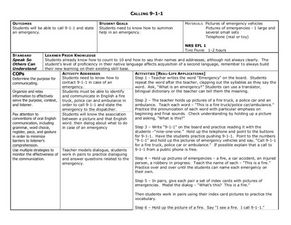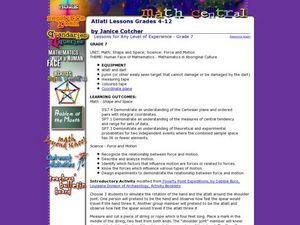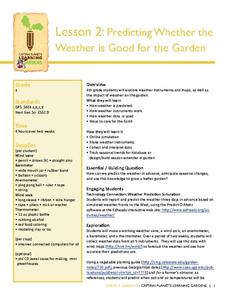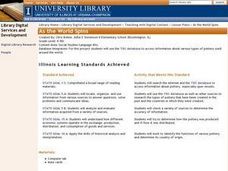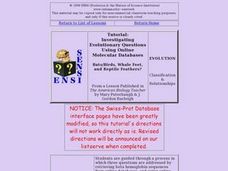Houghton Mifflin Harcourt
The Progressive Era: Muckrakers
Using Upton Sinclair's The Jungle, guide your class in the process of identifying unknown terms using context clues and formulating text-based answers. The lesson plan includes a useful worksheet incorporating scaffolding questions on an...
Curated OER
Influence of Beauty, The Beauty of Influence
Tenth graders explore the influence of art on modern societies. Through the internet, they assess paintings of advertisements for commercial products and social-political beliefs. Using spreadsheet software, the class compares and...
Curated OER
Deriving the Formula For the Area of a Circle
Young scholars derive the formula for the area of a circle. They form a rectangle by partitioning a circle using construction paper and scissors.
Curated OER
An Intuitive Introduction to Density
Students complete experiments discovering the relationship between density and mass. They use the internet to gather information before the experiment. They discuss the activity once it is completed.
Curated OER
Precipitation in Michigan Cities
Third graders investigate the rainfall amounts in four Michigan cities to observe how cities near lakes are affected differently by precipitation than those that are inland. They record the rainfall for the cities over an eight day...
Curated OER
"who Lives in Your House?"
Fourth graders collect data about the people and animals living in their homes, and the students' shoe sizes. They work in groups to enter the information into a database from which they create graphs. They analyze the data to find the...
Curated OER
Constructivist Theory
Students in a teacher education program are introduced to the constructivist theory. In grade level teams, they take their subject matter focus and create lesson plans related to the constructivist theory. They are graded with a rubric...
Curated OER
Design Team Challenge
Students work in groups to build a robot. In this robotics lesson, students create an electronic robot and program it to follow directions. They create an obstacle course for the robot to follow and test its performance.
Curated OER
Create and Locate Your Own Business
High schoolers simulate the creation of their own business. Using the internet and database exploration, they research community profiles and select a business. Pupils define the target market and investigate a business location. ...
Curated OER
Calling 9-1-1
Students analyze emergencies. In this safety lesson, students discover when and why they should dial 9-1-1. They discuss as a group various scenarios in which they would need to call 9-1-1 and then role-play those situations. This lesson...
Curated OER
Managing Medical Conditions
Students investigate more about a medical condition that is of interest to them and write what they have learned about that condition, using the information as a personal resource or to share with others. They record information they...
Curated OER
EUREKA!
Students gather information and complete a personal medical history form. They use this to aid in future medical experiences that they may have in their field of study. .Students write their medical histories to prepare for interactions...
Curated OER
Atlatl Lessons for Grade 7
Seventh graders examine force and motion. In this seventh grade mathematics/science lesson, 7th graders collect and analyze data regarding the use of an atlatl to throw a spear. Students describe and analyze the motion which leads to the...
Curated OER
Strategic Skill: Evaluating Information Quality Using Electronic Sources
Fourth graders review and complete evaluating information quality. In groups, they research the diversity of the numerous Native American tribes in Montana. They complete a worksheet on evaluating sources on the Internet and share...
Captain Planet Foundation
Which Plant Is Which?
Learn about dichotomous keys, plant identification, and how to care for the planet with a lesson plan that includes several hands-on and innovative activities. Kids go on a plant scavenger hunt and classify the plants that they find...
Captain Planet Foundation
Predicting Whether the Weather is Good for the Garden
Can your class predict the weather? Show them how they can come close with a lesson about creating weather instruments, including weather vanes, barometers, wind socks, anemometers, and thermometers. Kids research weather patterns and...
Louisiana Department of Education
Comprehensive Curriculum Social Studies (Grade 7)
US history from 1776 through 1877 is the focus of a comprehensive curriculum guide designed for seventh graders. Each of the seven units in the 102-page packet includes a list of guiding questions, grade-level expectations, links to...
Carolina K-12
Preventing Voter Fraud or Encouraging Voter Suppression?
The issues of voter fraud and voter suppression are relevant in every election, local as well as national. Soon-to-be voters learn about a recent bill proposed in North Carolina, the Voter Information and Verification Act, and decide for...
Curated OER
As the World Spins
Young scholars research forms of and uses for pottery. They examine the people who created the pottery and create a presentation to exhibit their findings.
Curated OER
Gopher, Part 2: Gopherin'
Students explore how to access a gopher site using a root menu. Several options are presented with their definitions and the fastest routes examined in this lesson. The lesson is designed for librarians with little or no net experience.
Curated OER
Cell Discoveries
Students observe, compare and describe cell organelles in terms of their function, structure and operation. They enter and edit information in a database, build and sort a student-designed database and find records in a database.
Curated OER
Millennium Superheroes
Students develop an understanding of the qualities that "superheroes," or people who have favorably influenced society, possess. They create a database with questions that pertain to what they want to find out about a hero of the...
Curated OER
Investigating Evolutionary Questions: Bats, Whales, Reptiles, Birds, Animal Classification
Students are guided through a process in which three questions are addressed by retrieving beta hemoglobin sequences from online databases, and using online tools to compare those sequences in student-selected animals.












